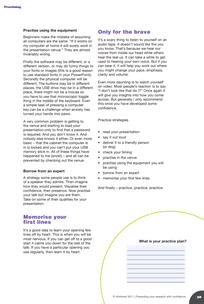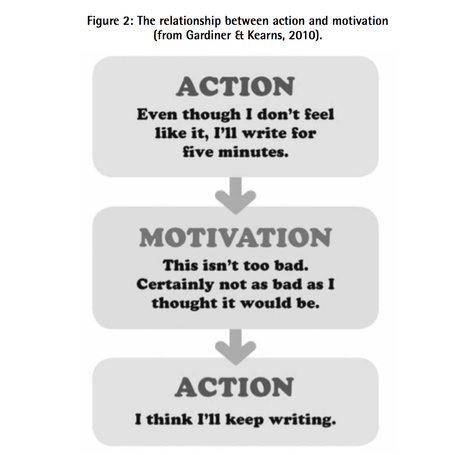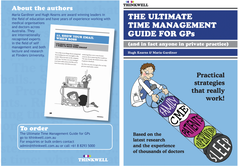 I went to a workshop during the PhD regarding the Seven Secrets of Highly Successful Research Students by Dr. Hugh Kearns. It was an inspiring workshop and one that I know now shaped how quickly I finished the PhD. He started the talk by telling us that there was someone in the room that was not supposed to be there and noted that the University had made a mistake and while he knows it was a large mistake that they are not supposed to pursue their research. He then went on to describe what imposter syndrome was, although this is for another blog post. It was an impactful start to the workshop that day and one I will remember for a long time. We all thought it was ourselves that were not supposed to be there. He then went on to give us material regarding how we could turbocharge our writing, tips for handling supervisors - (although I had the absolute best person/supervisor that a person could have asked for. She is both encouraging and supportive. She guided me along the PhD with ease and I trusted her entirely with the process. She always had my best interests at heart as I went to writing workshops, engaging with whatever was available on campus. She deserves an entire post dedicated to herself). The tips we received regarding handling supervisors was to do with handling power dynamics. Your supervisor dictates how long you spend on your PhD and your level of progression. While it is up to them how you progress and prepare you for the Graduate Committee every year. I have been in a PhD room with people that have taken 12 years full-time and others 7 years full-time and then others 3 years. It is self-paced and the pressure can be immense as you dictate your own speed, your own discipline and your own working schedule per day. Dr Hugh Kearns' workshop was one of those that structured a lot of the final stages of the PhD for me in that he gave us writing tips and a template for a word count. Again subscribing to the 'done is better than perfect' model as I speak so fondly about in my previous blog posts. Back to the power dynamics, the power is within you to finish it but is encumbered by your PhD supervisor. It is up to them entirely if the PhD is up to international standard and ready at each stage of the years of study that you have completed. Have you done enough per year in order to become a researcher. A PhD is like an apprenticeship in this regard, it teaches you to have a critical eye on research, look for good sources, understand the science and how to interpret data along with many more attributes. The relationship between a supervisor and their PhD student is one that can seem tricky to manage. You are not their priority (sorry to disappoint those of you that are hearing this for the first time), their priorities usually lie within their own research so it's also important to choose carefully and seek out a supervisor that aligns with their research and not only your philosophy (Epistemology) but also in terms of their theory on ontology and the construction of knowledge. Do they enact a power dynamic that is hierarchical or flat? It is the same in an workplace. These need to fit in order to progress. Teaching during the PhD, I was teaching data mining strategies using XLMiner as part of a two semester long workshop. A couple of years previously I had been working in an insurance company as a business analyst. I like to wear headphones to concentrate as the office was quite loud. My boss at the time decided that he didn't like this and that he had worked in busy offices in London and he got used to the noise. Let's just say I was reprimanded for wearing them. Long story short he was celebrating his 45th birthday in the XLMiner class that I was teaching. He was disrespectful and disruptive to the other Master's students. I had a quiet word and asked him to leave as he was removing the opportunity for his classmates who wanted to be there to actually learn. Karma always finds a way to find balance and in this case it was balanced in terms of power dynamics which I found quite funny. I was the one who had gone full circle, moved country, learnt more, worked harder and had more experience. It turns out he had to do the Master's programme because his Dad owned the insurance company and he didn't actually know much about it. Thankfully after the first class it was all fine and he understood that he couldn't be singing Happy Birthday in a workshop despite being 45 years of age on that day and wearing a huge badge. Subtle signs of power dynamics can be seen in everyday life. These things include people interrupting you, being late and not apologising and thumping their chests when they get code to work. These came up in the power dynamics discussion in the PhD workshop. All of these act as signs of asserting power over another. That is not to say that people don't do these things by accident, of course, we are human. However, when there is a concerted effort to enact these then it is a power dynamic that is contrived and can impact upon another person's self-esteem. Impacting upon a person's self-esteem of course is dependent on if they relate their identity to what they are doing at the time. If the person links it to who they are a person then this can be quite antagonistic. Being late: I was meeting a person recently and I travelled an hour to get there. I had thought to myself instinctually that this person might be late if they wanted to assert a power dynamic and 'test' how my reactions were at this time. It is a classic tactic that I have seen being used by American soldiers to 'test' the dynamics of the relationship. Unless you are aware of this tactic then you may think that it's something that was done unintentionally, however, it can be a behavioural strategy in order to push boundaries. I have several experiences with this and in the end it resulted in a conversation and understanding these power dynamics were, in fact, intentional. Again though, we are human and it depends on the person and if their wish is to shift the balance in the relationship or not. Interruptions: In the workplace be observant for women and men in a team and men cutting across women. It can be seen quite frequently in some places that I have worked. Interruption of someone speaking can be disruptive to the person and also explaining away certain points made by the person can be both damaging and an intentional strategy in order to assert power over the person. These 'chatterboxes' might come across as passionate and a lot of people tend to be forgiving towards these mishaps, however, start looking more in-depth and you will start to see patterns. Some are unintentional of course, however, when there are power dynamics at play in a competitive environment or if someone feels under threat, then naturally these tend to be intentional. It can be highly frustrating to the recipient of such assertions. The repeated behaviour can wear a person down to the point where they lose their voice. Not only is it highly frustrating but it can stop their train of thought, put them in the defence and eventually their brains can become encumbered by the survival mind. It can also be a battle of the brains as one asserts that 'my point is MORE valid' than yours thus also claiming the power dynamic across a team or organisation. Losing your own voice is the biggest repercussion when it comes to power dynamics. The ability to adapt and be flexible in a power dynamic is important. It is also a strategy to weigh up the pros and cons on if you are 'going to win' back the balance in the relationship or has their been too much of a power shift. A power shift can also happen in terms of making a person feel uncomfortable in a workplace. This is self-evident. The survival mind will become active as the person perceives their everyday life as under threat and eventually if all other power dynamics are enacted to assert power then their self-esteem will be eroded and they will lose their voice. There are also some power dynamics where a boss will give you something to do and want an argument. This is not a trustworthy power dynamic. Yes, of course, question what tasks you are doing but certainly culturally that is not something that is done in certain countries. I have worked with people in different countries that say yes to everything even when they don't understand it and then after giving them training, they fly back home and you find out that they don't understand a thing but culturally it is part of their culture to agree to their boss and what they say without question. I have also fallen for this as I have trusted my supervisor in a workplace previously and they have taken advantage of this through micromanagement and slowing down processes. This is also an intentional workplace power dynamic and can soon escalate into a toxic workplace. Although you might find yourself in this situation at the moment, it is time to move on and find a place where you will thrive. It is also important to remember that karma will always find a way to restore balance so you might just meet them in the future where you are in the position of teaching them on the Master's programme. Of course there are also other things at play like management style, time management, priorities etc. Greater efforts are needed to ensure that you are aware of these power dynamics at play in order to keep a balance and get your job done. In the PhD I was incredibly lucky to have such an amazing supervisor who corroborated with my research and excited to see my success. It was, of course, a sure-minded individual who wanted to see my success as she was also successful and that is beneficial for both parties. Further work needs to be done to align with the dynamics within an organisation to ensure that you align philosophically with their needs. I trusted my supervisor entirely to guide me on my path, I knew my best interests were taken into consideration. Although, this is not always the case in a workplace or with other supervisors. In part it is also about building trust and backing your work up with solid evidence. In some cases it might be necessary, certainly at the beginning to chart your progress, note everything and send back and forth meeting notes to establish transparency and trust. The key in all of these power dynamics is to listen to your own inner-being, your own voice. It can sometimes be a whisper and you need to listen to that whisper in terms of being in the right environment for you and whether you are achieving your goals or not. Do you find yourself progressing and are positively inspired going into the workplace? I had this now several times working where I wanted to go into work and I wanted to learn. I had a 'growth mindset' and I could trust my boss to look after my interests. It was a positive experience and one that I hope continues. These people that you surround yourself are successful and you can learn from their success. Surround yourself with these people and you will learn a lot about the contrasts in life and how you can thrive. Disclaimer: Power dynamics can impact a person's psyche as well and can be more sinister. I have only touched lightly on the topic above and omitted very relevant topics in today's world such as sexual harassment in the workplace. Survivors of sexual harassment may experience depression as their minds are encumbered by the survival mind and are fearful of all threats. This usually is a power dynamic to assert dominance on a person and make them feel so uncomfortable that the person will start to question parts of their identity. Physiological as well as psychological reactions can occur (please see link below for further reading). It is not something that anyone should experience but as a female I can tell you that I have experienced this first hand as with 1 in 3 women in the workplace (please see link below for further reading). If you are surprised by this figure then please open your eyes, look around and ask around. It is also not limited to women only. It can be men to men, men to women and women to men and all forms of gender. It is part of a power dynamic and where there are people, there are power dynamics. The survivors that I know have not only overcome this but also let go of shame and become an advocate for establishing better roles in the workplace. I have seen some that have gone onto thrive in their own right, find their voice and establish their own identities as something that has made them stronger and more resilient. They have overcome the effects of this and gone from surviving to thriving. Please seek help if this has happened to you. A message of hope for sexual harassment survivors: It can be good to find support in talking about this to others, it is rampant and talking only once to someone who has experienced this can allow you to gain perspective that it is not only you and that it is part of power dynamics. It is also important to note that healed people - heal people. It is something that will allow you to thrive eventually and unfortunately in today's society it seems to be unavoidable for many. When you heal you will live a fuller, more authentic live that allows you to follow your bliss - when you put the work in. Creativity is the highest form of love and you will create more, be more focused, overcome all the effects of sexual harassment and establish what you want. Remember the more exposed you are to people the more you will meet all different kinds, good and bad but for the most part they are mainly good. See Rocky speech below for inspiration. It can also be an interesting exercise to get into a taxi and ask the taxi driver if they think the world is full of good people or bad people in terms of the passengers that they have encountered. I can guarantee they will say that the world is 99% good people, even the 1% that are not are people that are hurting/projecting/feeling unloved and operating at lower levels of emotions. Remembering these things will help you to thrive and YOU WILL THRIVE. Recommended reading: Dr. Hugh Kearns Website: https://www.ithinkwell.com.au/hugh-kearns Kearns, H. & Gardiner, M.L. (2011). The care and maintenance of your adviser. Nature, 469(7331), 570-570. https://www.ithinkwell.com.au/content/nature_2011_student_advisers.pdf Gardiner, M. & Kearns, H. (2012). The ABCDE of Writing: Coaching high-quality high-quantity writing. International Coaching Psychology Review, 237-249. https://www.ithinkwell.com.au/content/ABCDEwriting.pdf Kearns, H. & Gardiner, M.L. (2011). Waiting for the motivation fairy. Nature, 472, 127. https://www.nature.com/articles/nj7341-127a.pdf Video link for following your instincts - point 3 relates to the workplace: https://youtu.be/NPQ0XCkD2jE Dealing with Shame: https://youtu.be/RSrXxqKfYwI Sexual harassment: https://www.usf.edu/student-affairs/victim-advocacy/types-of-crimes/sexualharassment.pdf 1 in 3 women experience Sexual harassment in the workplace: https://www.businessinsider.com/professional-women-have-experienced-sexual-harassment-2019-6?r=DE&IR=T Comments are closed.
|
|



